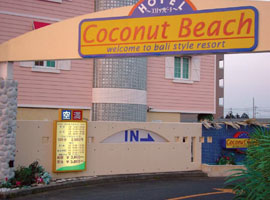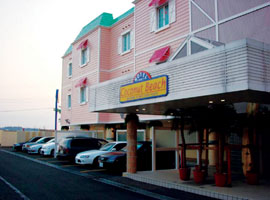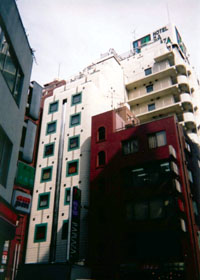Upfront: Love Hotel Fund Gets Started
Back to Contents of Issue: July 2004
|
|
|
|
by John Dodd |
|
 Although a taboo subject, many of Japan's 20+ million couples have experienced the pleasures of one of Japan's estimated 17,000 love hotels at some time or other. Whether a loss of innocence with a teenage sweetheart at the trendy Maruyama-cho district in Shibuya, or a furtive illicit liaison at a hotel cluster near a Tomei Freeway off-ramp, love hotels are an intimate part of the nation's culture.
Unfortunately for future generations, the love hotel business is in trouble. Due to over-expansion during the bubble of the late 80's and early 90's, a time when rooms cost up to $1 million each to build and furbish, a number of industry leaders and small chain operators are now in serious financial distress. It seems that the only way out for many of these companies is either substantial restructuring, or closure and sale of their assets. The problem is, because of the unsalubrious nature of the asset class, few conventional Japanese REITs are brave enough to make the necessary investment--and so the original lender banks remain on the hook and the debts continue to fester.
Even the more adventurous foreign REITs have stayed away from pink real estate, despite the strong returns. This is partly out of deference to their Japanese institutional investors who feel uncomfortable with the industry, and partly because many foreign institutional investors have rules forbidding such adventures. As a result, there are only three to four foreign investment funds dabbling in love hotel properties as a profitable side business--and you won't find any of them in the press.
This situation changed in April (2004), however, when three enterprising foreign partners launched Japan's first foreign love hotel specialist investment fund, announcing that they had successfully raised $10 million from European institutional and private investors. The new fund is MHS Capital Partners, and the successful raising of cash probably signals the beginning of a new era for love hotel investment. Indeed, just as the consumer credit industry bore a stigma until legitimized by some enterprising foreign firms, MHS sees the love hotel industry undergoing a similar transformation.
The Opportunity
Unfortunately, with no where to get capital for their operations, many of these companies are being sunk by their humungous property debts, and dissolving the companies appears the only way to return the industry back to health. MHS's plan is to buy distressed hotel properties in the range of $2~3 million each, and refurbish them to give them a new lease of life.
As partner Hamish Ross says, "This is not an industry where you can go out and buy a list of real estate available for sale. By the time the public knows of a property becoming available, it's been well and truly picked over." Instead the MHS team uses their focus on love hotel clusters around freeway offramps to go upfront and negotiate directly with operators--many of whom are also owners--they feel could be under financial pressure. The strategy is paying off.
MHS Capital Partners overall mission appears to be serving as a catalyst in what they hope will become a burgeoning, but niche, sector of the Japanese real estate investment scene. Using their numbers, according to which 30% of operators are in financial trouble, then we can assume the sector size is about 6,000 love hotels with an average value of JPY200--300 million ($1.81--2.72 million) each, or a total asset value of about JPY1.09--1.63 trillion ($12--18 billion).
Business Model
MHS expects that with both sources of income combined, investors could be enjoying yields of up to 25% over the full 5-year term of the fund. MHS also notes that a strong contributor to the likelihood of improved property values is that of increasingly restrictive building codes, limiting the number of new establishments--thus driving up the demand for existing sites.
Although a number of love hotel operators are in trouble, Ross assures us that the industry as a whole is still doing fine. According to Leisure Hotel ("leisure" here being a polite word for "love"), the only magazine covering the industry, love hotels are Japan's highest tax-paying industry, forking out even more than pachinko parlors. Furthermore, with the introduction of such innovations as in-room karaoke, pool tables, video games, etc., the demand for love hotels among the key audience of 18- to 25-year-olds is increasing. Traditionally, this sexually active group has used the hotels as a means of escaping parents and siblings while learning the arts of amour. And they show no signs of slowing down...
Tanaka-san, Was That You I Saw? Ever interested in social trends, we did ask Ross about the likely demographic of love hotel users. Initially he gave us the tactful response that no one really knows--not least because customers don't want to meet the manager and staff, and so everything is highly automated. Even the garages have noren, the neck-high curtains that block the view of outsiders as patrons get out cars. But when pressed, he admitted it is common knowledge that remote hotels near highway offramps have a high level of patronage by cheating couples, particularly office managers and their subordinates. Thus investors can relax knowing that human nature is proven to be remarkably consistent around the world... And the old adage, "if you don't use, it you lose it", is well understood in Japan! @ |
|
Note: The function "email this page" is currently not supported for this page.


 In probably what has to be one of the most fascinating jobs in Japan right now, the three-man team is analyzing available properties and hopes to close on its first deal by June 2004. Their abilities are significantly boosted by the talents and experience of founding partner Miro Mijatovic, an Australian lawyer whose background of four years of legal, tax, and financial services to Tokyo-based love hotel operators has earned him "insider" status in this very closed industry. The remainder of the team consists of operations specialist Kiwi Hamish Ross, a long-term resident of Tokyo with deep banking and commercial experience, and American Scott Delaney, a global finance expert with the investor relationships.
In probably what has to be one of the most fascinating jobs in Japan right now, the three-man team is analyzing available properties and hopes to close on its first deal by June 2004. Their abilities are significantly boosted by the talents and experience of founding partner Miro Mijatovic, an Australian lawyer whose background of four years of legal, tax, and financial services to Tokyo-based love hotel operators has earned him "insider" status in this very closed industry. The remainder of the team consists of operations specialist Kiwi Hamish Ross, a long-term resident of Tokyo with deep banking and commercial experience, and American Scott Delaney, a global finance expert with the investor relationships.
 But this age group is also very discerning and spurns old facilities in favor of those being continually refurbished. This is tough on the groups whose cash is locked up in bank interest repayments, and thus worsens the gap between the financially sound and those who were overexposed. A key MHS strategy will be to buy the out-of-favor hotels and quickly refurbish and upgrade these properties--which at today's rates can be done for just 20% of what it cost 10 to 15 years ago. The MHS target will be establishments with 25 to 40 rooms, a size that they say is both manageable and marketable.
But this age group is also very discerning and spurns old facilities in favor of those being continually refurbished. This is tough on the groups whose cash is locked up in bank interest repayments, and thus worsens the gap between the financially sound and those who were overexposed. A key MHS strategy will be to buy the out-of-favor hotels and quickly refurbish and upgrade these properties--which at today's rates can be done for just 20% of what it cost 10 to 15 years ago. The MHS target will be establishments with 25 to 40 rooms, a size that they say is both manageable and marketable.



